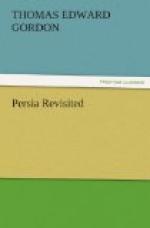The English national love of sport has lately introduced into Tehran the popular gymkhana, an institution which hails from India, where it is English enterprise under an Indian name. The British Legation has started this amusement, and it seems to provide energy for many who had longed for some fresh outdoor exercise, but could not organize it. Now, when weather permits, there are weekly gatherings for variety races, tent-pegging, and paper-chases. A very amusing and effective novelty, which I saw there for the first time, was a donkey tug-of-war. This new ‘gym’ was imported by a sporting young diplomatic secretary, who had lately arrived from Cairo, where he had seen it in full exercise. Tehran has excellent riding-donkeys for hire, well turned out, and attended by the usual smart-tongued youth. Eight donkeys, four a side, heading outwards, all ridden by Europeans, mostly English, were engaged in this sport. Neither whip nor spur was allowed. The rope was passed along under the right arm, and held as each rider thought best. At the word ‘Off!’ heels were brought into fast play on the donkeys’ ribs to make them move forward, and the scenes that followed were ludicrous and exciting. Riders were pulled off backward, and, still hanging on to the rope, they managed to remount and get again into the pulling line in time to drag off someone on the opposite side, who had lost his balance on the sudden ‘go’ forward from the lessened strain. This amusement was a highly popular one with the laughing spectators.
Our travelling-party on the outward journey had separated at Tehran, and I travelled back homeward alone. I left Tehran in the middle of November, and as there had been a heavy fall of snow some days before, I quite expected to have a cold crossing of the Kharzan Pass over the Elburz range. I did the journey to Kasvin comfortably in a carriage, and rode thence to Resht in three days. I was unexpectedly fortunate in finding that the bright weather had freed the road over the pass from snow, and I had a perfect day, with still air, for that part of my ride.
About halfway between Kasvin and Resht the road passes through the extensive olive-groves of Rudbar, which for many centuries has been the centre of a flourishing olive-oil and soap business. There are about sixty villages in the district engaged in this industry; they possess from eighty to one hundred thousand trees, each yielding on an average from six to nine pounds’ weight of fruit a year. The olive as a fruit-tree has been known in Persia from a comparatively early period, and it is not surprising to hear the villagers ascribe quite a fabulous age to some of the old trees, just as in Italy some olives are credited with an equally astonishing antiquity.
To me it has appeared that the habit the olive has of sending up new stems from the root of an old trunk—just as the chenar sycamore does in Persia—may have made the old trees become young again, and thus present, to succeeding generations in the villages, the look of the same old trunks. Messrs. Kousis, Theophylactos and Co., of Baku, have obtained a concession for pressing and refining olive-oil in this district, and I observed the buildings which they are erecting for their business rising on the right bank of the river there.




